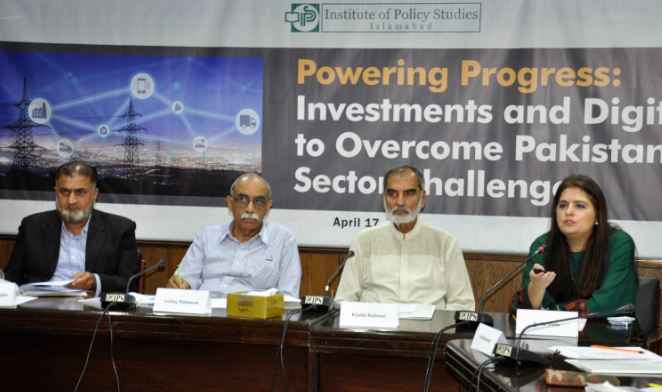DNA
Islamabad, APR 18: Digitization is the future and it must be tailored toward addressing the lack of electricity transmission infrastructure to ensure price affordability and accessibility to consumers.
Targeted investments and digital transformation must go hand-in-hand with effective resource management, thoughtful policy development, governance reforms as well as innovation in system planning, highlighted experts during a hybrid seminar on “Powering Progress: Investments and Digitization to Overcome Pakistan’s Power Sector Challenges,” held at the Institute of Policy Studies (IPS), Islamabad.
The session, chaired by Ashfaq Mahmood, former federal secretary, water & power, was addressed as speakers by Khalid Rahman, chairman IPS, Mirza Hamid Hassan, chairman, IPS’ steering committee for energy, water & climate change and former federal secretary, water & power, Mazhar Iqbal Ranjha, registrar, National Electric Power Regulatory Authority (NEPRA), Sadia Dada, CMCO, K-Electric, Salahuddin Rifai, former GM NTDC, and eminent energy experts associated with IPS including Asad Mehmood, Ahmed Ammar Yasser, and Ameena Sohail.
Energy dependency is a major issue and Pakistan needs to escape the vicious cycle through out-of-the-box thinking and win-win solutions at policy and practice level, said Khalid Rahman in his opening remarks.
The power sector must be focused on overcoming the energy trilemma revolving around the availability, accessibility, and affordability of electricity, said Sadia Dada. For that, power industry must integrate new solutions and ensure targeted investments, she added.
While drawing on the modelling of the power system undertaken by K-Electric (KE), she said that since privatization the company has made a targeted investment of 474 billion rupees – six times more than its profit – across its value chain that has resulted in doubling its customer base from 1.8 million to 3.4 million, increasing its energy supplies from 2,200 MW to 3,380 MW, and reducing its transmission and distribution (T&D) losses from 34.2% to 15.3% which surpasses the target set by NEPRA for the year.
She further added that keeping in view the rising power demand in its serving territory, K-Electric plans to invest additional 484 billion rupees for the next seven years, which would add 2,172 MW in its generation capacity, including 1,182 MW of renewables. Through its investment plan 2030, KE aims to introduce more innovations in its distribution segment, such as Advanced Distribution Management System, mobile workforce management, Geographical Information Systems (GIS), and Advance Analytics & Artificial Intelligence that would translate into improved customer experience through faster resolution, fewer interruptions, and enhanced capacity.
Salahuddin Rifai highlighted that technology and digitization ideas have often been wrongly tackled by the power sector. Consequently, all the costs and expenses are borne by consumers, making the affordability goal futile. He stressed a consumer-oriented power sector and optimization of cost. Also, as effective use of resources and ideas requires energy experts’ input, a professional board must be developed to advise the government in planning, he added.
To establish greater power security in Pakistan, there is a need to systematize wholly with an improved approach, said Mazhar Ranjha. Case studies on different aspects, including tariff indexation, investments, planning, digital transformation, etc. must be done to derive workable solutions.
Mirza Hamid said that a major reason for the burden on consumers is because of the obsolete and less efficient power transmission system; therefore, power transmission must be made an investment priority area, along with energy transition and digitization, he added.
As future power planning is important for Pakistan, Ahmed Ammar stressed investments to be done in mobilizing the power policy, along with technology and innovative tools. Moreover, structural and management reforms must the made a priority to address structural issues and deficiencies in the system’s planning capacity, he added.
Endorsing the need for ingenious solutions and techniques, Asad Mahmood stressed that digitization is the future, and if implemented in letter and spirit, it can address Pakistan’s power sector insecurity. Along with that, a greater focus must also be given to indigenization and sound decision-making, as it would not only address system challenges but also ownership issues, added Ameena Sohail.
In his concluding remarks, Ashfaq Mahmood stressed that power investment, policy planning, and digitization must be oriented towards transmission, and not generation, to ensure price affordability as well as accessibility to customers. Moreover, a financing plan and investment strategy must be made to overcome the issues.

















